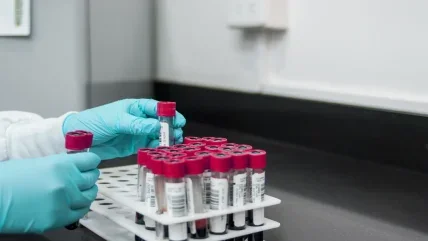
Pfizer’s Braftovi (encorafenib) in combination with Mektovi (binimetinib) has shown a long-term, clinically meaningful response in patients with BRAF V600E-mutant metastatic non-small cell lung cancer (NSCLC) in a Phase 2 clinical trial.
The longer-term follow-up results from the PHAROS clinical trial demonstrated promising outcomes for both treatment-naïve and previously treated patients.
After an additional 18 months of follow-up, the objective response rate (ORR) in treatment-naïve patients was 75%, with a median duration of response (DoR) of 40 months. In previously treated patients, the ORR was 46%, with a median DoR of 16.7 months, as assessed by independent radiology review.
Furthermore, after nearly three years of follow-up in treatment-naïve patients, the median progression-free survival (PFS) for the investigational combination was 30.2 months, while the median overall survival (OS) has not yet been reached.
These results are set to be presented at the European Society for Medical Oncology (ESMO) Congress 2024 in Barcelona, Spain.
PHAROS is an open-label, multicentre, single-arm study evaluating the efficacy and safety of the Braftovi and Mektovi combination therapy in both treatment-naïve and previously treated patients with BRAF V600E-mutant metastatic NSCLC.
In the longer-term follow-up of previously treated patients, the drug combination achieved a median PFS of 9.3 months and a median OS of 22.7 months. The safety profile remained consistent with earlier findings, with no new safety concerns identified.
Treatment-related adverse events (AEs) led to dose reductions in 26% of patients and permanent discontinuation in 16%, with nausea, diarrhoea, and fatigue being the most common AEs.
Pfizer oncology chief development officer Roger Dansey said: “These potentially practice-changing results from the PHAROS trial show that the combination of Braftovi and Mektovi is providing long-term compelling efficacy for patients, and although no definitive conclusions can be made across trials, the duration of response and progression-free survival in treatment-naive patients appear to be the longest observed for BRAF V600E–mutant metastatic NSCLC compared with historical outcomes.
“These latest data reflect our deep understanding of the science behind biomarker-driven cancers and add to our legacy in developing innovative targeted treatments in NSCLC.”
Braftovi and Mektovi were approved by the US Food and Drug Administration (FDA) in October 2023 and by the European Commission in August 2024 for the treatment of BRAF V600E-mutant metastatic NSCLC.
In a separate announcement, Pfizer has reported that its Phase 2 study of ponsegromab, a monoclonal antibody targeting growth differentiation factor-15 (GDF-15), has met its primary endpoint. The study demonstrated a significant change from baseline in body weight compared to placebo in patients with cancer cachexia and elevated levels of GDF-15.






